Critically Discussing Consumer-Directed Case Management in Aged Care
VerifiedAdded on 2023/06/10
|9
|2445
|256
Essay
AI Summary
This essay provides a critical analysis of consumer-directed case management in the aged care sector, focusing on its strengths and weaknesses. It begins by defining key concepts such as consumer-directed care and case management, highlighting the person-centered approach. The essay delves into the background of aged care in Australia, examining the increasing aged population and the social issues they face, along with the government's policy reforms. It critically evaluates the advantages of a person-centered approach, such as reduced stress and enhanced relationships, while also addressing the disadvantages, including increased costs and potential inequalities. The essay also examines the ethical dilemmas and challenges associated with this approach. The analysis draws upon various research sources and case studies to support its arguments, concluding with a comprehensive overview of the complexities of consumer-directed case management in aged care.
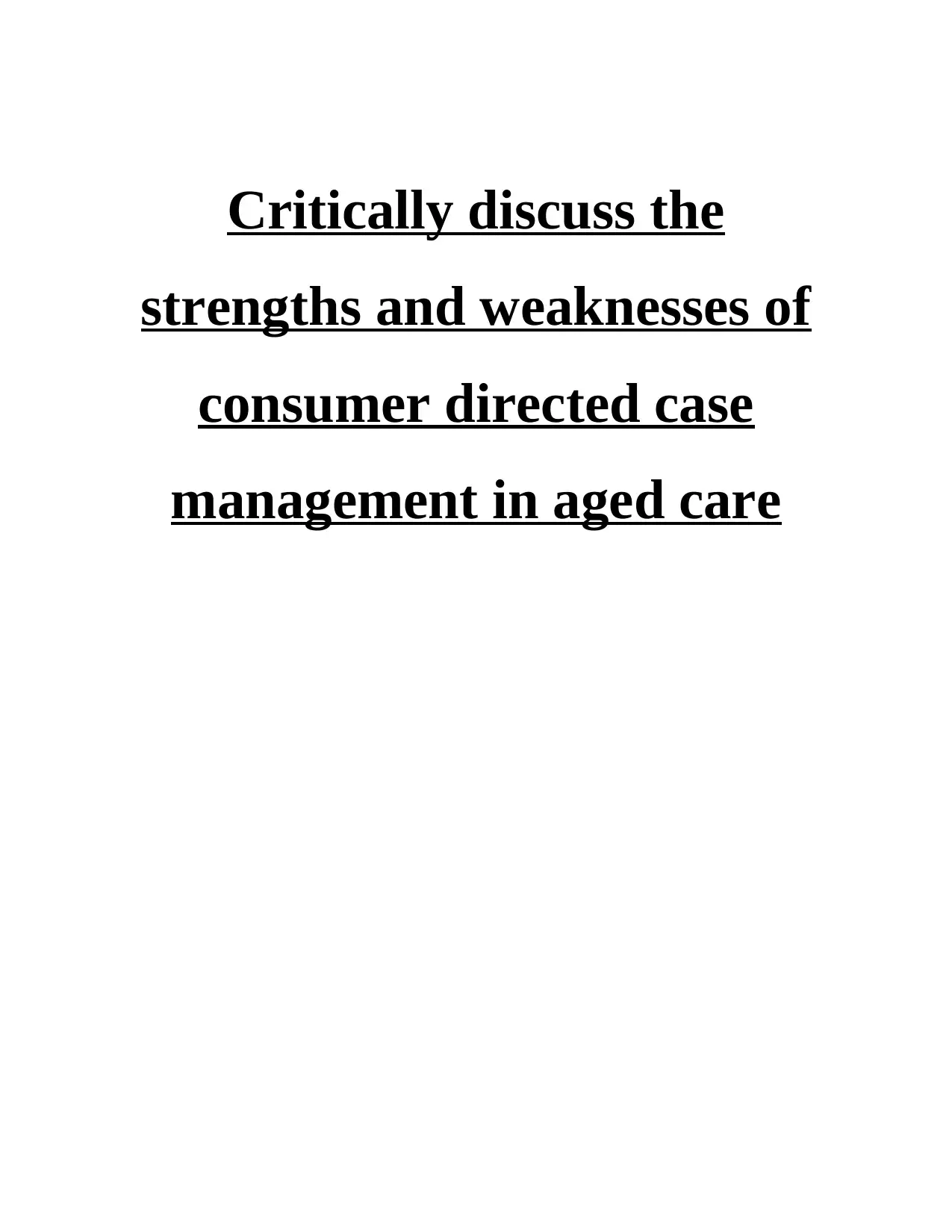
Critically discuss the
strengths and weaknesses of
consumer directed case
management in aged care
strengths and weaknesses of
consumer directed case
management in aged care
Paraphrase This Document
Need a fresh take? Get an instant paraphrase of this document with our AI Paraphraser
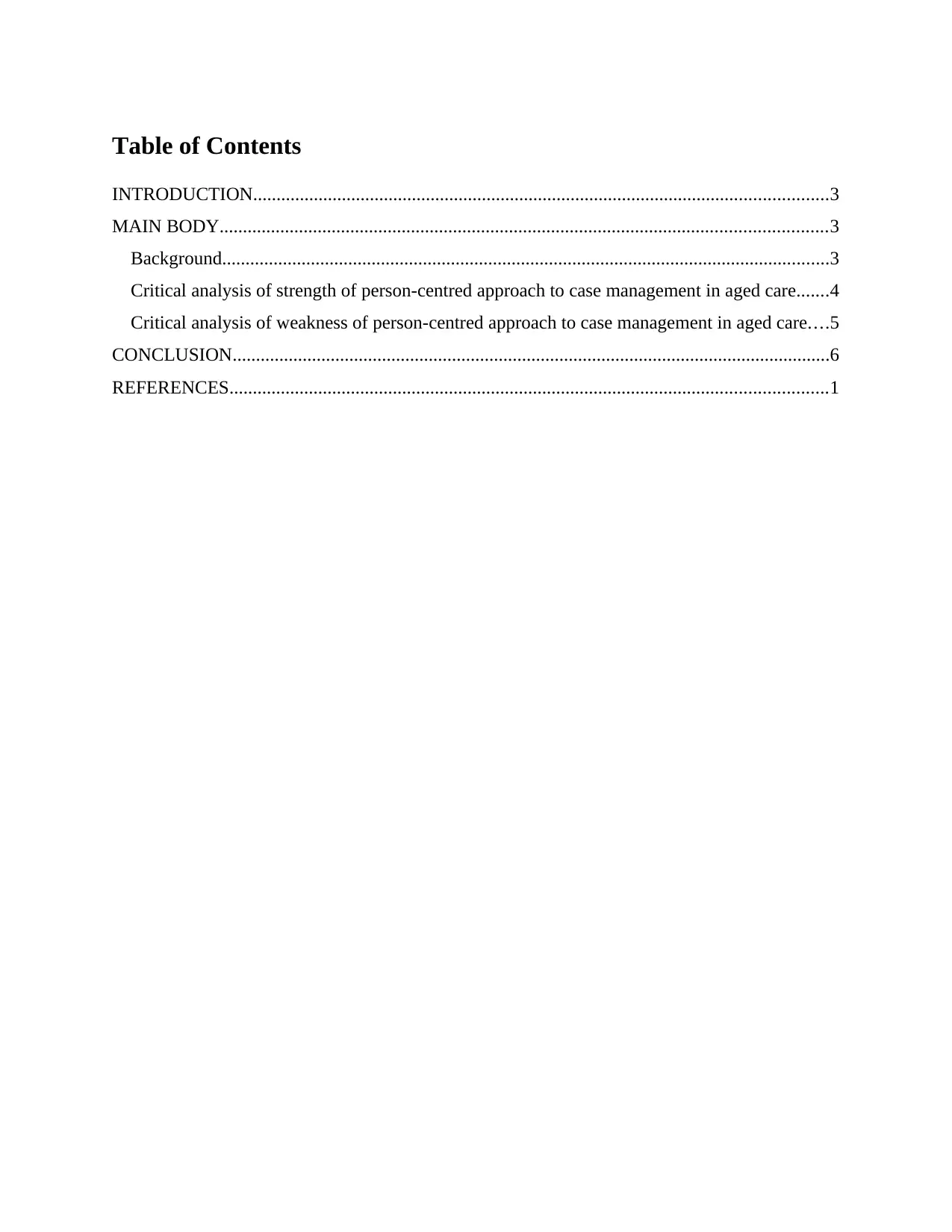
Table of Contents
INTRODUCTION...........................................................................................................................3
MAIN BODY..................................................................................................................................3
Background..................................................................................................................................3
Critical analysis of strength of person-centred approach to case management in aged care.......4
Critical analysis of weakness of person-centred approach to case management in aged care....5
CONCLUSION................................................................................................................................6
REFERENCES................................................................................................................................1
INTRODUCTION...........................................................................................................................3
MAIN BODY..................................................................................................................................3
Background..................................................................................................................................3
Critical analysis of strength of person-centred approach to case management in aged care.......4
Critical analysis of weakness of person-centred approach to case management in aged care....5
CONCLUSION................................................................................................................................6
REFERENCES................................................................................................................................1
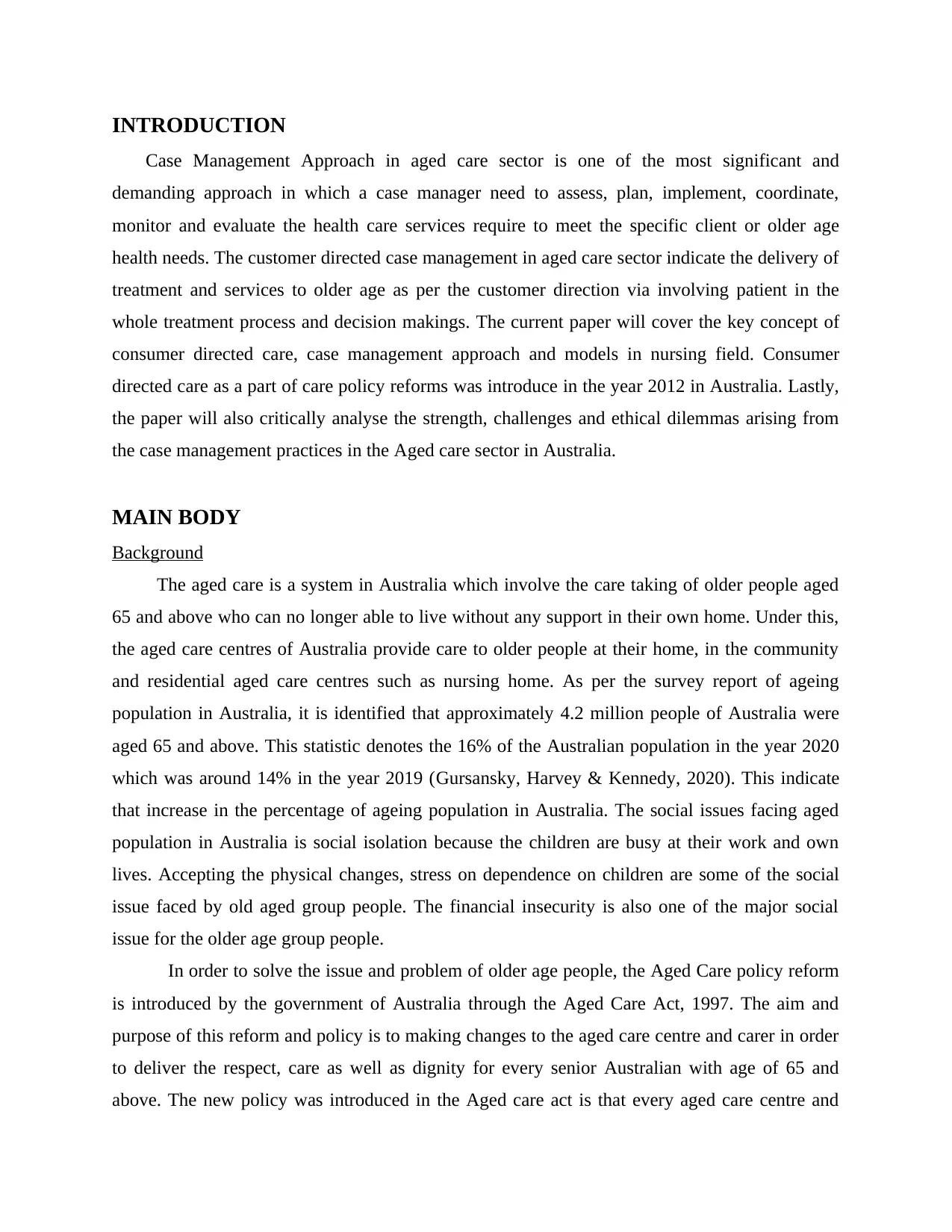
INTRODUCTION
Case Management Approach in aged care sector is one of the most significant and
demanding approach in which a case manager need to assess, plan, implement, coordinate,
monitor and evaluate the health care services require to meet the specific client or older age
health needs. The customer directed case management in aged care sector indicate the delivery of
treatment and services to older age as per the customer direction via involving patient in the
whole treatment process and decision makings. The current paper will cover the key concept of
consumer directed care, case management approach and models in nursing field. Consumer
directed care as a part of care policy reforms was introduce in the year 2012 in Australia. Lastly,
the paper will also critically analyse the strength, challenges and ethical dilemmas arising from
the case management practices in the Aged care sector in Australia.
MAIN BODY
Background
The aged care is a system in Australia which involve the care taking of older people aged
65 and above who can no longer able to live without any support in their own home. Under this,
the aged care centres of Australia provide care to older people at their home, in the community
and residential aged care centres such as nursing home. As per the survey report of ageing
population in Australia, it is identified that approximately 4.2 million people of Australia were
aged 65 and above. This statistic denotes the 16% of the Australian population in the year 2020
which was around 14% in the year 2019 (Gursansky, Harvey & Kennedy, 2020). This indicate
that increase in the percentage of ageing population in Australia. The social issues facing aged
population in Australia is social isolation because the children are busy at their work and own
lives. Accepting the physical changes, stress on dependence on children are some of the social
issue faced by old aged group people. The financial insecurity is also one of the major social
issue for the older age group people.
In order to solve the issue and problem of older age people, the Aged Care policy reform
is introduced by the government of Australia through the Aged Care Act, 1997. The aim and
purpose of this reform and policy is to making changes to the aged care centre and carer in order
to deliver the respect, care as well as dignity for every senior Australian with age of 65 and
above. The new policy was introduced in the Aged care act is that every aged care centre and
Case Management Approach in aged care sector is one of the most significant and
demanding approach in which a case manager need to assess, plan, implement, coordinate,
monitor and evaluate the health care services require to meet the specific client or older age
health needs. The customer directed case management in aged care sector indicate the delivery of
treatment and services to older age as per the customer direction via involving patient in the
whole treatment process and decision makings. The current paper will cover the key concept of
consumer directed care, case management approach and models in nursing field. Consumer
directed care as a part of care policy reforms was introduce in the year 2012 in Australia. Lastly,
the paper will also critically analyse the strength, challenges and ethical dilemmas arising from
the case management practices in the Aged care sector in Australia.
MAIN BODY
Background
The aged care is a system in Australia which involve the care taking of older people aged
65 and above who can no longer able to live without any support in their own home. Under this,
the aged care centres of Australia provide care to older people at their home, in the community
and residential aged care centres such as nursing home. As per the survey report of ageing
population in Australia, it is identified that approximately 4.2 million people of Australia were
aged 65 and above. This statistic denotes the 16% of the Australian population in the year 2020
which was around 14% in the year 2019 (Gursansky, Harvey & Kennedy, 2020). This indicate
that increase in the percentage of ageing population in Australia. The social issues facing aged
population in Australia is social isolation because the children are busy at their work and own
lives. Accepting the physical changes, stress on dependence on children are some of the social
issue faced by old aged group people. The financial insecurity is also one of the major social
issue for the older age group people.
In order to solve the issue and problem of older age people, the Aged Care policy reform
is introduced by the government of Australia through the Aged Care Act, 1997. The aim and
purpose of this reform and policy is to making changes to the aged care centre and carer in order
to deliver the respect, care as well as dignity for every senior Australian with age of 65 and
above. The new policy was introduced in the Aged care act is that every aged care centre and
⊘ This is a preview!⊘
Do you want full access?
Subscribe today to unlock all pages.

Trusted by 1+ million students worldwide
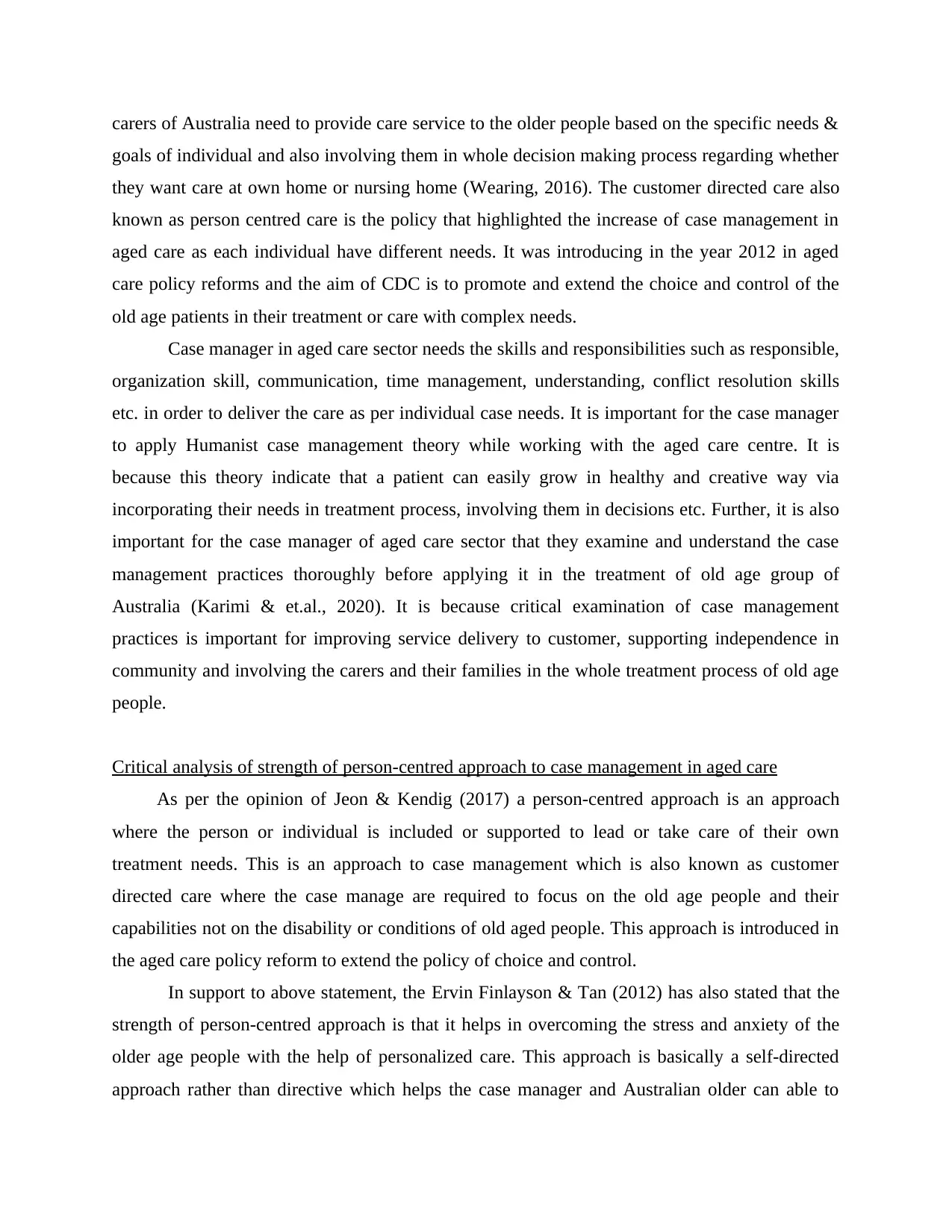
carers of Australia need to provide care service to the older people based on the specific needs &
goals of individual and also involving them in whole decision making process regarding whether
they want care at own home or nursing home (Wearing, 2016). The customer directed care also
known as person centred care is the policy that highlighted the increase of case management in
aged care as each individual have different needs. It was introducing in the year 2012 in aged
care policy reforms and the aim of CDC is to promote and extend the choice and control of the
old age patients in their treatment or care with complex needs.
Case manager in aged care sector needs the skills and responsibilities such as responsible,
organization skill, communication, time management, understanding, conflict resolution skills
etc. in order to deliver the care as per individual case needs. It is important for the case manager
to apply Humanist case management theory while working with the aged care centre. It is
because this theory indicate that a patient can easily grow in healthy and creative way via
incorporating their needs in treatment process, involving them in decisions etc. Further, it is also
important for the case manager of aged care sector that they examine and understand the case
management practices thoroughly before applying it in the treatment of old age group of
Australia (Karimi & et.al., 2020). It is because critical examination of case management
practices is important for improving service delivery to customer, supporting independence in
community and involving the carers and their families in the whole treatment process of old age
people.
Critical analysis of strength of person-centred approach to case management in aged care
As per the opinion of Jeon & Kendig (2017) a person-centred approach is an approach
where the person or individual is included or supported to lead or take care of their own
treatment needs. This is an approach to case management which is also known as customer
directed care where the case manage are required to focus on the old age people and their
capabilities not on the disability or conditions of old aged people. This approach is introduced in
the aged care policy reform to extend the policy of choice and control.
In support to above statement, the Ervin Finlayson & Tan (2012) has also stated that the
strength of person-centred approach is that it helps in overcoming the stress and anxiety of the
older age people with the help of personalized care. This approach is basically a self-directed
approach rather than directive which helps the case manager and Australian older can able to
goals of individual and also involving them in whole decision making process regarding whether
they want care at own home or nursing home (Wearing, 2016). The customer directed care also
known as person centred care is the policy that highlighted the increase of case management in
aged care as each individual have different needs. It was introducing in the year 2012 in aged
care policy reforms and the aim of CDC is to promote and extend the choice and control of the
old age patients in their treatment or care with complex needs.
Case manager in aged care sector needs the skills and responsibilities such as responsible,
organization skill, communication, time management, understanding, conflict resolution skills
etc. in order to deliver the care as per individual case needs. It is important for the case manager
to apply Humanist case management theory while working with the aged care centre. It is
because this theory indicate that a patient can easily grow in healthy and creative way via
incorporating their needs in treatment process, involving them in decisions etc. Further, it is also
important for the case manager of aged care sector that they examine and understand the case
management practices thoroughly before applying it in the treatment of old age group of
Australia (Karimi & et.al., 2020). It is because critical examination of case management
practices is important for improving service delivery to customer, supporting independence in
community and involving the carers and their families in the whole treatment process of old age
people.
Critical analysis of strength of person-centred approach to case management in aged care
As per the opinion of Jeon & Kendig (2017) a person-centred approach is an approach
where the person or individual is included or supported to lead or take care of their own
treatment needs. This is an approach to case management which is also known as customer
directed care where the case manage are required to focus on the old age people and their
capabilities not on the disability or conditions of old aged people. This approach is introduced in
the aged care policy reform to extend the policy of choice and control.
In support to above statement, the Ervin Finlayson & Tan (2012) has also stated that the
strength of person-centred approach is that it helps in overcoming the stress and anxiety of the
older age people with the help of personalized care. This approach is basically a self-directed
approach rather than directive which helps the case manager and Australian older can able to
Paraphrase This Document
Need a fresh take? Get an instant paraphrase of this document with our AI Paraphraser
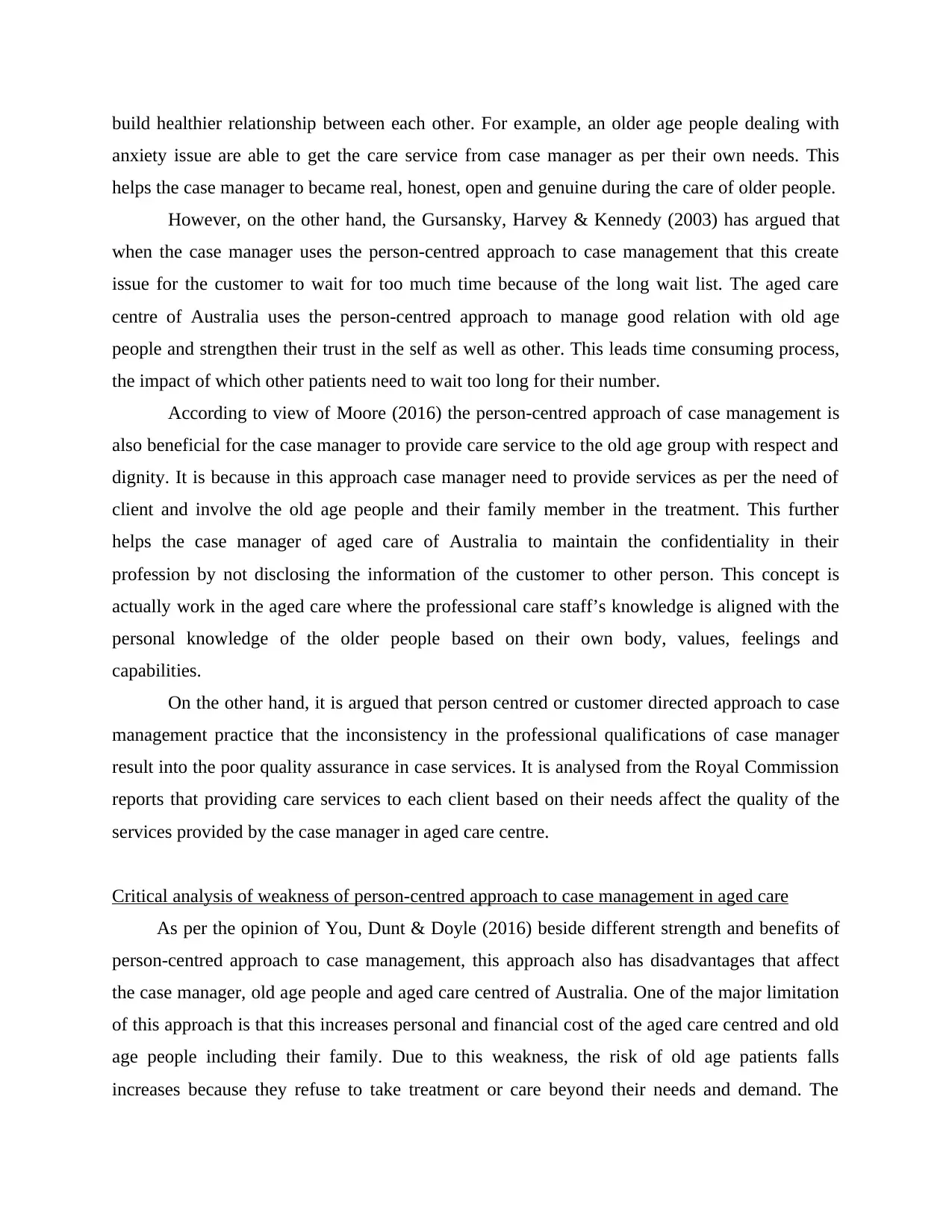
build healthier relationship between each other. For example, an older age people dealing with
anxiety issue are able to get the care service from case manager as per their own needs. This
helps the case manager to became real, honest, open and genuine during the care of older people.
However, on the other hand, the Gursansky, Harvey & Kennedy (2003) has argued that
when the case manager uses the person-centred approach to case management that this create
issue for the customer to wait for too much time because of the long wait list. The aged care
centre of Australia uses the person-centred approach to manage good relation with old age
people and strengthen their trust in the self as well as other. This leads time consuming process,
the impact of which other patients need to wait too long for their number.
According to view of Moore (2016) the person-centred approach of case management is
also beneficial for the case manager to provide care service to the old age group with respect and
dignity. It is because in this approach case manager need to provide services as per the need of
client and involve the old age people and their family member in the treatment. This further
helps the case manager of aged care of Australia to maintain the confidentiality in their
profession by not disclosing the information of the customer to other person. This concept is
actually work in the aged care where the professional care staff’s knowledge is aligned with the
personal knowledge of the older people based on their own body, values, feelings and
capabilities.
On the other hand, it is argued that person centred or customer directed approach to case
management practice that the inconsistency in the professional qualifications of case manager
result into the poor quality assurance in case services. It is analysed from the Royal Commission
reports that providing care services to each client based on their needs affect the quality of the
services provided by the case manager in aged care centre.
Critical analysis of weakness of person-centred approach to case management in aged care
As per the opinion of You, Dunt & Doyle (2016) beside different strength and benefits of
person-centred approach to case management, this approach also has disadvantages that affect
the case manager, old age people and aged care centred of Australia. One of the major limitation
of this approach is that this increases personal and financial cost of the aged care centred and old
age people including their family. Due to this weakness, the risk of old age patients falls
increases because they refuse to take treatment or care beyond their needs and demand. The
anxiety issue are able to get the care service from case manager as per their own needs. This
helps the case manager to became real, honest, open and genuine during the care of older people.
However, on the other hand, the Gursansky, Harvey & Kennedy (2003) has argued that
when the case manager uses the person-centred approach to case management that this create
issue for the customer to wait for too much time because of the long wait list. The aged care
centre of Australia uses the person-centred approach to manage good relation with old age
people and strengthen their trust in the self as well as other. This leads time consuming process,
the impact of which other patients need to wait too long for their number.
According to view of Moore (2016) the person-centred approach of case management is
also beneficial for the case manager to provide care service to the old age group with respect and
dignity. It is because in this approach case manager need to provide services as per the need of
client and involve the old age people and their family member in the treatment. This further
helps the case manager of aged care of Australia to maintain the confidentiality in their
profession by not disclosing the information of the customer to other person. This concept is
actually work in the aged care where the professional care staff’s knowledge is aligned with the
personal knowledge of the older people based on their own body, values, feelings and
capabilities.
On the other hand, it is argued that person centred or customer directed approach to case
management practice that the inconsistency in the professional qualifications of case manager
result into the poor quality assurance in case services. It is analysed from the Royal Commission
reports that providing care services to each client based on their needs affect the quality of the
services provided by the case manager in aged care centre.
Critical analysis of weakness of person-centred approach to case management in aged care
As per the opinion of You, Dunt & Doyle (2016) beside different strength and benefits of
person-centred approach to case management, this approach also has disadvantages that affect
the case manager, old age people and aged care centred of Australia. One of the major limitation
of this approach is that this increases personal and financial cost of the aged care centred and old
age people including their family. Due to this weakness, the risk of old age patients falls
increases because they refuse to take treatment or care beyond their needs and demand. The
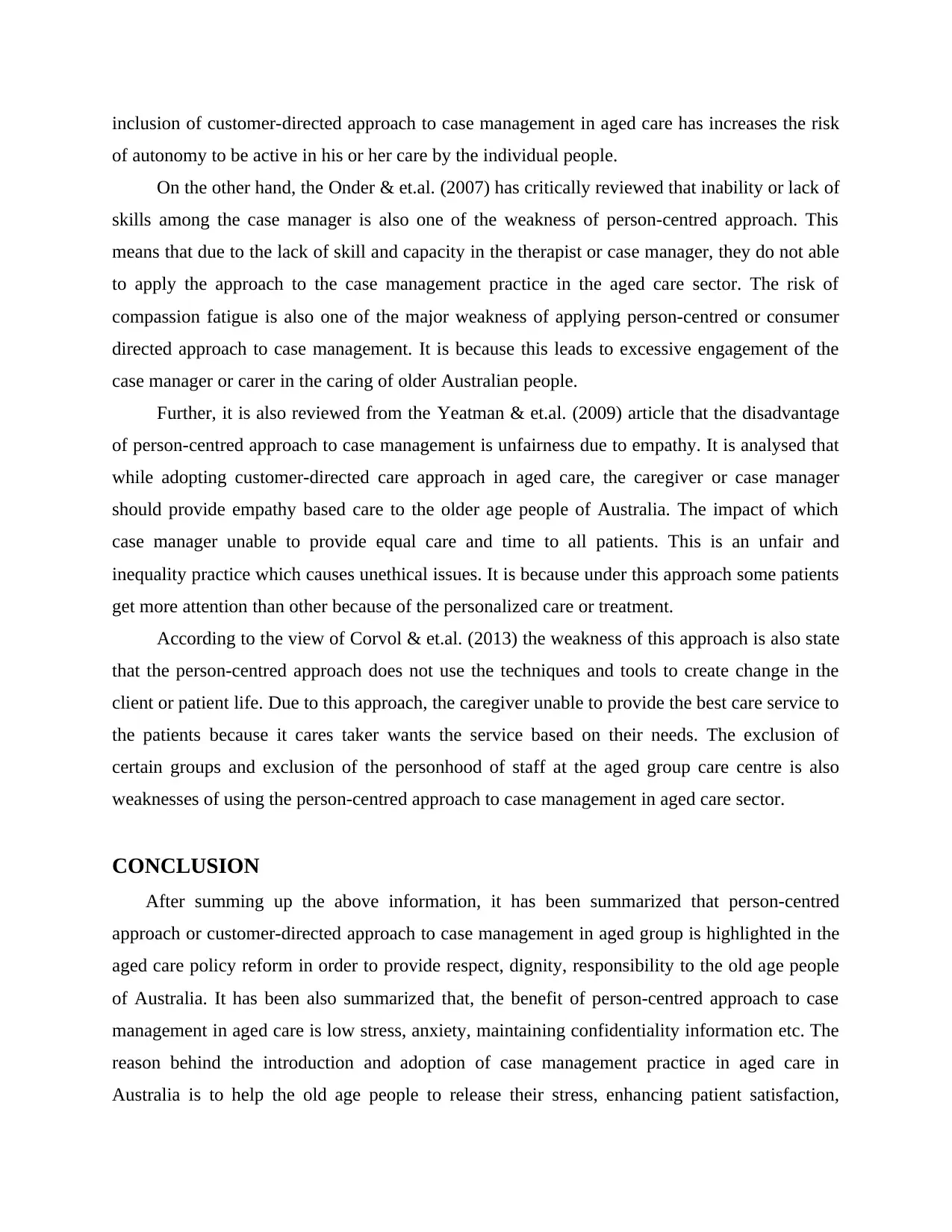
inclusion of customer-directed approach to case management in aged care has increases the risk
of autonomy to be active in his or her care by the individual people.
On the other hand, the Onder & et.al. (2007) has critically reviewed that inability or lack of
skills among the case manager is also one of the weakness of person-centred approach. This
means that due to the lack of skill and capacity in the therapist or case manager, they do not able
to apply the approach to the case management practice in the aged care sector. The risk of
compassion fatigue is also one of the major weakness of applying person-centred or consumer
directed approach to case management. It is because this leads to excessive engagement of the
case manager or carer in the caring of older Australian people.
Further, it is also reviewed from the Yeatman & et.al. (2009) article that the disadvantage
of person-centred approach to case management is unfairness due to empathy. It is analysed that
while adopting customer-directed care approach in aged care, the caregiver or case manager
should provide empathy based care to the older age people of Australia. The impact of which
case manager unable to provide equal care and time to all patients. This is an unfair and
inequality practice which causes unethical issues. It is because under this approach some patients
get more attention than other because of the personalized care or treatment.
According to the view of Corvol & et.al. (2013) the weakness of this approach is also state
that the person-centred approach does not use the techniques and tools to create change in the
client or patient life. Due to this approach, the caregiver unable to provide the best care service to
the patients because it cares taker wants the service based on their needs. The exclusion of
certain groups and exclusion of the personhood of staff at the aged group care centre is also
weaknesses of using the person-centred approach to case management in aged care sector.
CONCLUSION
After summing up the above information, it has been summarized that person-centred
approach or customer-directed approach to case management in aged group is highlighted in the
aged care policy reform in order to provide respect, dignity, responsibility to the old age people
of Australia. It has been also summarized that, the benefit of person-centred approach to case
management in aged care is low stress, anxiety, maintaining confidentiality information etc. The
reason behind the introduction and adoption of case management practice in aged care in
Australia is to help the old age people to release their stress, enhancing patient satisfaction,
of autonomy to be active in his or her care by the individual people.
On the other hand, the Onder & et.al. (2007) has critically reviewed that inability or lack of
skills among the case manager is also one of the weakness of person-centred approach. This
means that due to the lack of skill and capacity in the therapist or case manager, they do not able
to apply the approach to the case management practice in the aged care sector. The risk of
compassion fatigue is also one of the major weakness of applying person-centred or consumer
directed approach to case management. It is because this leads to excessive engagement of the
case manager or carer in the caring of older Australian people.
Further, it is also reviewed from the Yeatman & et.al. (2009) article that the disadvantage
of person-centred approach to case management is unfairness due to empathy. It is analysed that
while adopting customer-directed care approach in aged care, the caregiver or case manager
should provide empathy based care to the older age people of Australia. The impact of which
case manager unable to provide equal care and time to all patients. This is an unfair and
inequality practice which causes unethical issues. It is because under this approach some patients
get more attention than other because of the personalized care or treatment.
According to the view of Corvol & et.al. (2013) the weakness of this approach is also state
that the person-centred approach does not use the techniques and tools to create change in the
client or patient life. Due to this approach, the caregiver unable to provide the best care service to
the patients because it cares taker wants the service based on their needs. The exclusion of
certain groups and exclusion of the personhood of staff at the aged group care centre is also
weaknesses of using the person-centred approach to case management in aged care sector.
CONCLUSION
After summing up the above information, it has been summarized that person-centred
approach or customer-directed approach to case management in aged group is highlighted in the
aged care policy reform in order to provide respect, dignity, responsibility to the old age people
of Australia. It has been also summarized that, the benefit of person-centred approach to case
management in aged care is low stress, anxiety, maintaining confidentiality information etc. The
reason behind the introduction and adoption of case management practice in aged care in
Australia is to help the old age people to release their stress, enhancing patient satisfaction,
⊘ This is a preview!⊘
Do you want full access?
Subscribe today to unlock all pages.

Trusted by 1+ million students worldwide

reducing unnecessary utilization of resources etc. It has been also analysed that the person-
centred approach to case management have weakness of increase personal and financial cost,
exclusion of certain groups, in equality and unfairness among patients etc.
centred approach to case management have weakness of increase personal and financial cost,
exclusion of certain groups, in equality and unfairness among patients etc.
Paraphrase This Document
Need a fresh take? Get an instant paraphrase of this document with our AI Paraphraser
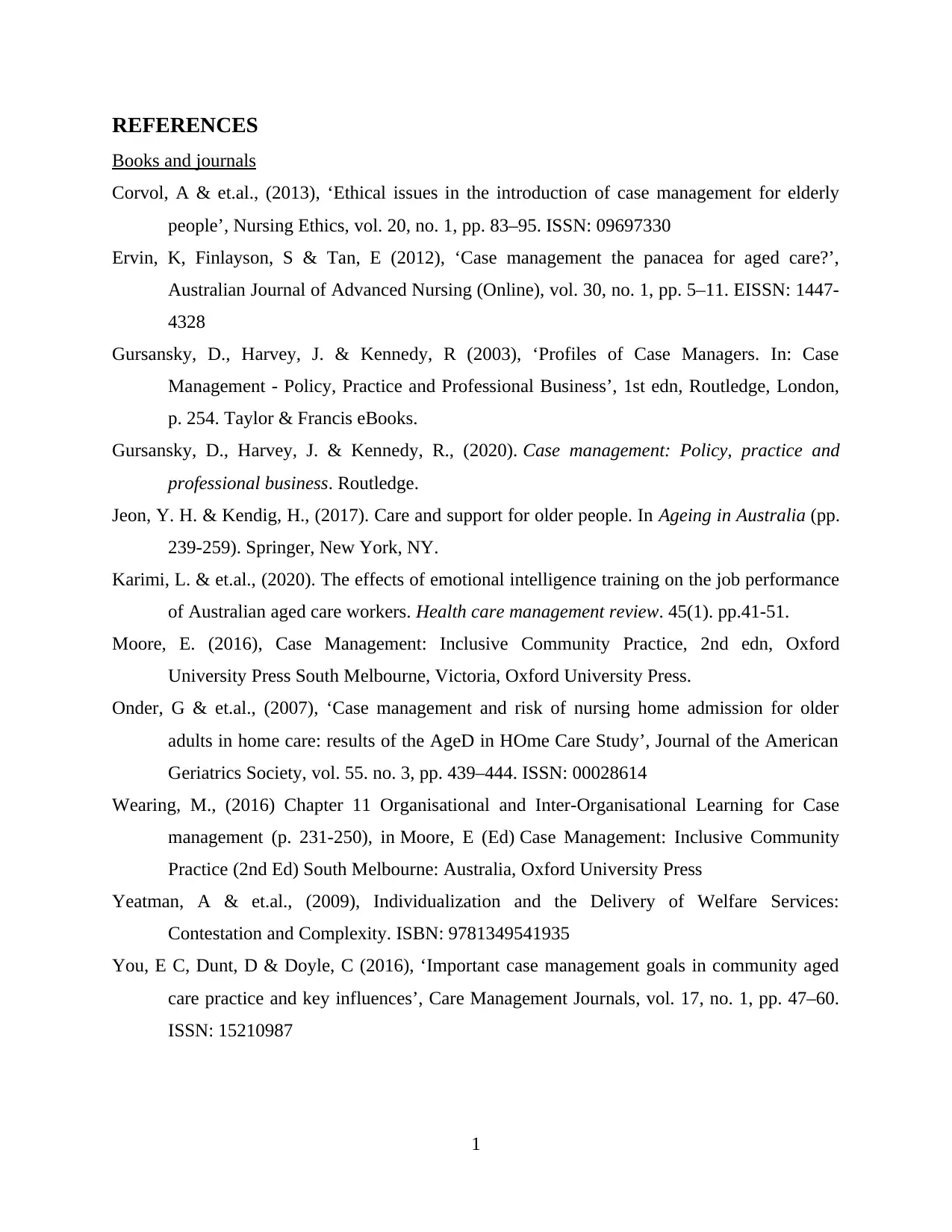
REFERENCES
Books and journals
Corvol, A & et.al., (2013), ‘Ethical issues in the introduction of case management for elderly
people’, Nursing Ethics, vol. 20, no. 1, pp. 83–95. ISSN: 09697330
Ervin, K, Finlayson, S & Tan, E (2012), ‘Case management the panacea for aged care?’,
Australian Journal of Advanced Nursing (Online), vol. 30, no. 1, pp. 5–11. EISSN: 1447-
4328
Gursansky, D., Harvey, J. & Kennedy, R (2003), ‘Profiles of Case Managers. In: Case
Management - Policy, Practice and Professional Business’, 1st edn, Routledge, London,
p. 254. Taylor & Francis eBooks.
Gursansky, D., Harvey, J. & Kennedy, R., (2020). Case management: Policy, practice and
professional business. Routledge.
Jeon, Y. H. & Kendig, H., (2017). Care and support for older people. In Ageing in Australia (pp.
239-259). Springer, New York, NY.
Karimi, L. & et.al., (2020). The effects of emotional intelligence training on the job performance
of Australian aged care workers. Health care management review. 45(1). pp.41-51.
Moore, E. (2016), Case Management: Inclusive Community Practice, 2nd edn, Oxford
University Press South Melbourne, Victoria, Oxford University Press.
Onder, G & et.al., (2007), ‘Case management and risk of nursing home admission for older
adults in home care: results of the AgeD in HOme Care Study’, Journal of the American
Geriatrics Society, vol. 55. no. 3, pp. 439–444. ISSN: 00028614
Wearing, M., (2016) Chapter 11 Organisational and Inter-Organisational Learning for Case
management (p. 231-250), in Moore, E (Ed) Case Management: Inclusive Community
Practice (2nd Ed) South Melbourne: Australia, Oxford University Press
Yeatman, A & et.al., (2009), Individualization and the Delivery of Welfare Services:
Contestation and Complexity. ISBN: 9781349541935
You, E C, Dunt, D & Doyle, C (2016), ‘Important case management goals in community aged
care practice and key influences’, Care Management Journals, vol. 17, no. 1, pp. 47–60.
ISSN: 15210987
1
Books and journals
Corvol, A & et.al., (2013), ‘Ethical issues in the introduction of case management for elderly
people’, Nursing Ethics, vol. 20, no. 1, pp. 83–95. ISSN: 09697330
Ervin, K, Finlayson, S & Tan, E (2012), ‘Case management the panacea for aged care?’,
Australian Journal of Advanced Nursing (Online), vol. 30, no. 1, pp. 5–11. EISSN: 1447-
4328
Gursansky, D., Harvey, J. & Kennedy, R (2003), ‘Profiles of Case Managers. In: Case
Management - Policy, Practice and Professional Business’, 1st edn, Routledge, London,
p. 254. Taylor & Francis eBooks.
Gursansky, D., Harvey, J. & Kennedy, R., (2020). Case management: Policy, practice and
professional business. Routledge.
Jeon, Y. H. & Kendig, H., (2017). Care and support for older people. In Ageing in Australia (pp.
239-259). Springer, New York, NY.
Karimi, L. & et.al., (2020). The effects of emotional intelligence training on the job performance
of Australian aged care workers. Health care management review. 45(1). pp.41-51.
Moore, E. (2016), Case Management: Inclusive Community Practice, 2nd edn, Oxford
University Press South Melbourne, Victoria, Oxford University Press.
Onder, G & et.al., (2007), ‘Case management and risk of nursing home admission for older
adults in home care: results of the AgeD in HOme Care Study’, Journal of the American
Geriatrics Society, vol. 55. no. 3, pp. 439–444. ISSN: 00028614
Wearing, M., (2016) Chapter 11 Organisational and Inter-Organisational Learning for Case
management (p. 231-250), in Moore, E (Ed) Case Management: Inclusive Community
Practice (2nd Ed) South Melbourne: Australia, Oxford University Press
Yeatman, A & et.al., (2009), Individualization and the Delivery of Welfare Services:
Contestation and Complexity. ISBN: 9781349541935
You, E C, Dunt, D & Doyle, C (2016), ‘Important case management goals in community aged
care practice and key influences’, Care Management Journals, vol. 17, no. 1, pp. 47–60.
ISSN: 15210987
1

2
⊘ This is a preview!⊘
Do you want full access?
Subscribe today to unlock all pages.

Trusted by 1+ million students worldwide
1 out of 9
Related Documents
Your All-in-One AI-Powered Toolkit for Academic Success.
+13062052269
info@desklib.com
Available 24*7 on WhatsApp / Email
![[object Object]](/_next/static/media/star-bottom.7253800d.svg)
Unlock your academic potential
Copyright © 2020–2026 A2Z Services. All Rights Reserved. Developed and managed by ZUCOL.




